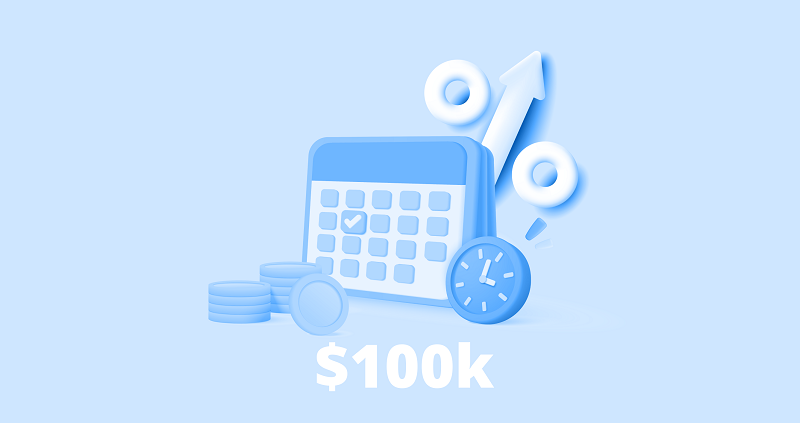How to choose a financial advisor
Find the perfect financial advisor for you by learning what to look for, which questions to ask, and how to align their services with your financial goals.
Define your financial goals first: Knowing what you need (e.g., retirement planning, debt management, or investment advice) can help you narrow down your advisor search.
Understand advisor types and costs: Fee-only, commission-based, robo-advisors, and traditional advisors all offer different levels of services and pricing.
Ask the right questions: Verifying credentials, compensation structures, and fiduciary duty can help you find a trustworthy financial partner.
What is a financial advisor?
A financial advisor is a professional who guides, educates, advises, and helps you stay on top of and reach your financial goals. Financial advisors help individuals and businesses manage their finances and make informed decisions about money. Their goal is to help clients achieve their financial objectives, such as saving for retirement, building wealth, managing debt, or investing wisely.
How to find the best financial advisor
Finding the "best" financial advisor is easier said than done. There is no one-size-fits-all approach, as everyone has their own unique financial situation, goals, and needs, but there are steps you can take to find the right financial advisor to meet your requirements. Essentially, there is no such thing as the "best" financial advisor, but rather finding the best financial advisor that suits your needs.
Here are seven steps to help you find the right financial advisor:
Step 1: Determine your financial goals
To begin with, you might want to clearly define your financial goals or what you would like a financial advisor to help you achieve.
Financial advisors typically offer services such as:
Creating personalized financial plans
Investment advice or portfolio monitoring
Tax planning
Cash flow management
Insurance recommendations
While some financial advisors may provide more broad, generalized services, other financial advisors might be specialists, providing services in one particular area of finance.
Determining your goals and identifying what you need or don’t need can help you better decide what type of financial advisor to work with, which can help you save time and money.
Some examples of financial goals include:
Personal finance: If you are planning for a specific savings goal — such as buying a home or a car, saving for college, or saving for a vacation — a financial advisor can advise you on how to structure your budget and investments to help reach these goals. Even if you don’t have a particular short- or long-term goal in mind and simply need help with better spending or budgeting your money, financial advisors can create a budgeting or financial plan to help you better manage this.
Paying off debt: If you are trying to pay back credit card debt, student loans, or other types of debt and can’t seem to get your balance down, you might want to consider a financial advisor who specializes in debt management and repayment to help you get your finances back on track.
- Multiple financial tasks: If you want some help with a bit of everything, from budget management to estate planning, a holistic financial planner might be the best fit for you. They can help answer all of your financial concerns and design a plan to manage all of your financial goals.
Step 2: Learn the terminology
When searching for a financial advisor, you might encounter some new lingo. Understanding the key terminology can help you stay more informed and help you avoid potential pitfalls.
Here is a list of important terms to know:
Fiduciary: A fiduciary is someone who is legally and ethically required to act in your best interest — even if it conflicts with their own. Not all financial advisors are fiduciaries, so it is important to ask if they are.
Fee-Only: An advisor who is paid by the client rather than through commissions or product sales. They are usually more transparent and less conflicted.
Fee-Based: A hybrid model where an advisor is paid by fees but may also earn commissions.
Commission-Based: An advisor who is paid through product sales, such as insurance or mutual funds.
Certified Financial Planner (CFP): A professional certification attained through education, testing, and adherence to a fiduciary standard. CFPs must complete verified training and uphold ethics, offering more trust and credibility.
Assets Under Management (AUM): The total value of all the assets an advisor manages on your behalf. Advisors may charge a percentage of AUM, usually 1% AUM, so it is important to stay informed.
Robo-advisor: An automated investment service that uses algorithms for portfolio management.
Suitability Standard: Requires that the investment recommendations are ‘suitable’ for the client, but not necessarily the best. These standards are usually lower than fiduciary.
- Registered Investment Advisor (RIA): A firm or individual registered with the United States Securities and Exchange Commission (SEC) or state regulators that usually acts as a fiduciary — meaning they are to act in the client’s best interest.
Step 3: Determine what type of financial advisor you need
Setting your financial goals can help you better decide what type of service, or services, you will need to meet your targets. Advisors may offer varying services and specialize in different areas, so understanding what you need can help you narrow your choices. Furthermore, your goals might change with your life circumstances, so you may want to consider choosing a financial advisor flexible enough to evolve with you.
You might also want to consider what type of financial advisor you are looking for.
Robo-advisors offer digitalized, more simplified services ideal for investment management. They generally have lower costs, but may not be fit for someone who needs rigorous financial planning or is looking for face-to-face interaction with a person.
Online financial planners provide virtual access to a human financial advisor, and fall into the medium cost range, which is more than a robo-advisor but less than a traditional advisor. This may be beneficial to those who need more holistic financial planning services, but may not be enough for those who need in-person contact.
Traditional financial advisors may offer in-person holistic advice for all of your financial planning needs, but are often the highest-cost option. However, it might be an ideal fit for those with complex financial situations needing specialized services, and wish to develop a more personal long-term relationship with their advisor.
Step 4: Consider the cost of a financial advisor
When it comes to finding the right financial advisor, it is important to consider how much your budget allows for. While financial advisors are known for being costly, there are still options available for most budgets.
It is also important to understand different price structures. Prices may vary between robo-advisors and traditional advisors, as well as with fee- and commission-based advisors. Fees may also be divided between percentage, hourly, subscription, or flat fees, so it is crucial to look into the price structure of a financial advisor to ensure it is within your planned budget.
Step 5: Check the financial advisor's credentials
Since a financial advisor will be giving you financial advice and managing your money, it is crucial you choose someone you can trust. This is where learning the terminology can also help you out.
Financial advisors can go by many titles, including investment advisors, brokers, portfolio managers, financial coaches, or financial managers. However, these titles are not tied to any credentials, nor do they guarantee them, so it is important to do some background research first as well as check their fee structure.
You might first want to check if they are a fiduciary — since this person will be guiding you financially and dealing with your money, it is important to know if they are working in your best interest. Additionally, you might also want to check if they are a CFP, who also uphold fiduciary duties to their clients, or a RIA, which is regulated by the SEC.
When searching for a financial advisor, you might want to ensure they are fiduciaries and have a CFP or RIA credential to help you figure out the trustworthiness of that advisor. You can also use online tools, such as using FINRA’s BrokerCheck, to verify a financial advisor’s status, see if they have a potential conflict of interest, or view any possible disciplinary actions or complaints filed against them.
Finding the right financial advisor can take time, but you want to ensure your money is in good hands.
Step 6: Prepare the right questions
After defining your goals and doing your background research, you might want to prepare some questions for your potential financial advisor to ensure they are the right match.
Here is a checklist of questions you can ask a potential financial advisor, which can help you evaluate whether they’re a good fit for your financial needs and goals:
Do you act as a fiduciary at all times, even when selling commission-based products?
What are your credentials?
Do you have experience working with clients like me?
What type of services do you provide, and do you create a comprehensive financial plan?
Will I be working directly with you or with a team?
What is your fee structure, do you earn any product commissions, and are there any additional costs (e.g., fund fees, trading costs, termination fees)?
How do you choose investments for your clients, and what is your approach to risk management?
How often do you rebalance portfolios?
How will you tailor your advice to my personal goals?
Have you ever had any disciplinary actions or complaints filed against you?
Do you have conflicts of interest I should know about?
Will I have access to financial planning software or dashboards?
If there is a specific topic you have questions about, you might want to conduct extra research beforehand. You could also bring a printed or digital list of questions with you to your appointment. Trust and transparency are critical in these relationships, so a good advisor will welcome your questions.
Step 7: Hire a financial advisor
If you are satisfied with a specific advisor’s background, have had an initial appointment with them, had any questions or concerns answered, and are confident they are the right match to help you meet your goals, the next step would be starting to work with them and scheduling regular meetings.
The hiring process may vary from advisor to advisor, so you may also want to ask your potential financial advisor what to expect. Now you are ready to start working with them!
How to know if you need a financial advisor
Everyone has a different method when it comes to managing their money. While some people have no issue handling their finances, others may need help from a professional — which is why financial advisors are here to assist you.
Some signs showing it might be time to seek help from a financial advisor include an inability to grow your money or pay off debt, restructuring a portfolio that is constantly underperforming, major life changes (e.g., getting a divorce, buying a house, moving states, having or adopting a child), or a drastic change in your salary. You can also consider a financial advisor if you’ve recently received an inheritance and want to mitigate taxes, or if you are getting started with or reevaluating your estate planning. If you need further help with managing taxes, you may even benefit from the help of a financial planner and an accountant.
Whatever the reason may be, it may be wiser to turn to a professional when it comes to seeking financial advice, as many of them are there to work in your best interest and help you meet your goals.
Bottom line
If you are wondering, “How do I choose a financial advisor?”, it might be best to take your time finding one that will help you best reach your financial goals. Make a checklist, clearly define your goals, do your background checks, and write down any important questions to ensure you find one that best suits your needs. The right advisor will also be your financial partner, helping your goals become reality and guiding you along the way.
If you’re looking for other options to grow your money and keep your finances in check, Raisin is here to help. The Raisin marketplace gives you access to a variety of high-yield savings products with competitive interest rates to help make the most of your savings. Sign up today and start growing your wealth.
The above article is intended to provide generalized financial information designed to educate a broad segment of the public; it does not give personalized tax, investment, legal, or other business and professional advice. Before taking any action, you should always seek the assistance of a professional who knows your particular situation for advice on taxes, your investments, the law, or any other business and professional matters that affect you and/or your business.


